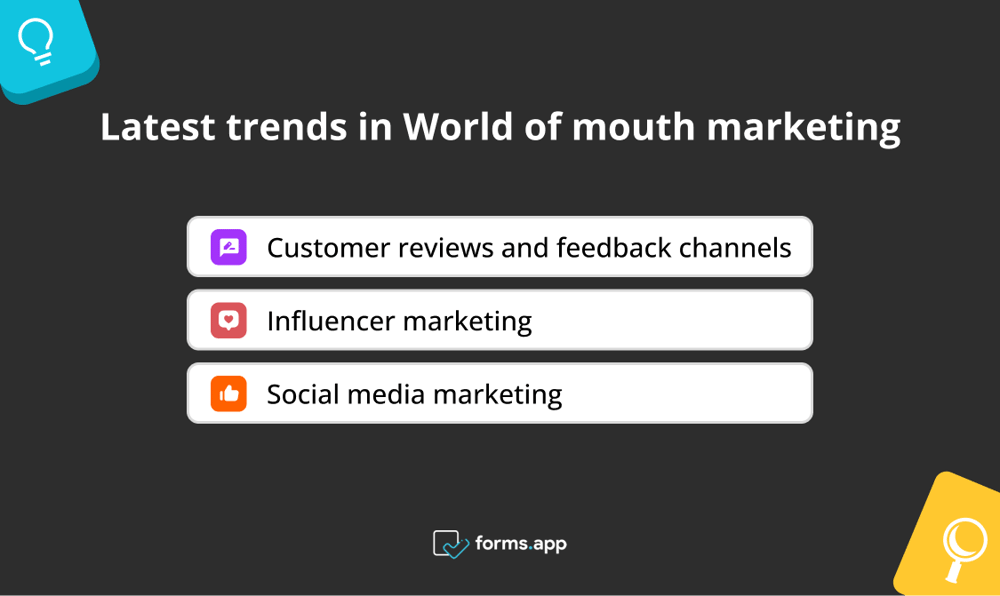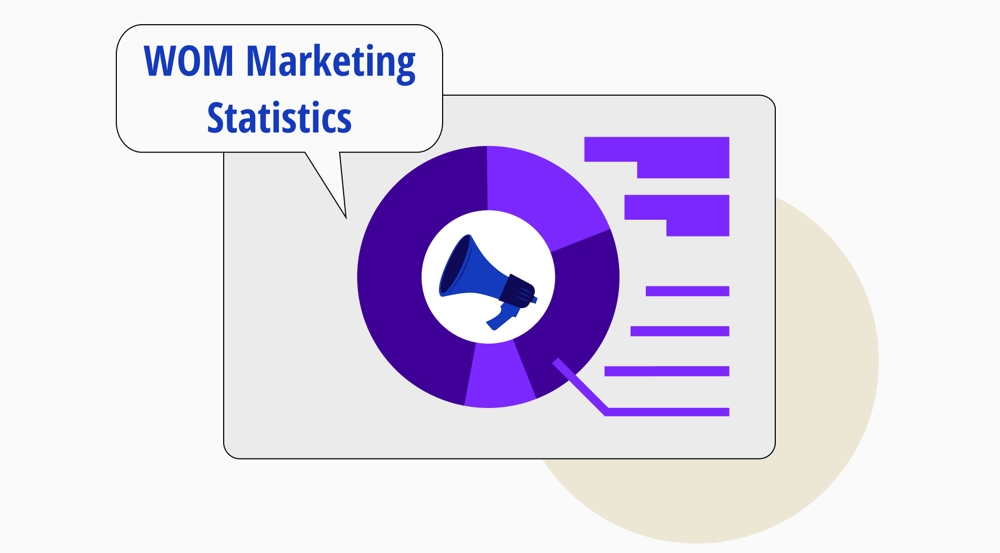Word-of-mouth marketing has a significant influence on consumers' decisions. It is a powerful marketing strategy that involves customers naturally promoting a brand or product by sharing their own experiences. It enables consumers to make decisions based on personal recommendations. Word-of-mouth marketing is an essential strategy used to increase customer satisfaction and brand loyalty.
For brands, word-of-mouth marketing strategies are crucial for brand promotion and customer loyalty. In order to help you gain insights about the topic, we have prepared 20+ word-of-mouth statistics in our article. Let's move on to our article.
Highlights about word-of-mouth marketing
When customers who are satisfied with the services you offer promote the brand through their efforts, it creates free advertising for your brand. Statistics on word-of-mouth marketing will help you find examples that will allow you to draw comparisons and conclusions for your business.
Here, you will find key points about word-of-mouth marketing and strategies to engage your target audience:
- 26% of consumers will stay away from a brand entirely if a friend or relative has had a bad experience with it (Semrush Blog).
- Millennials are influenced by word-of-mouth marketing 115% more than traditional advertising (Writers Blog Live).
- About 50% of marketers think that between 20% and 40% of leads originate from recommendations (TriveMyWay).
- Word-of-mouth recommendations typically result in 200% more spending than other sources of customers (Writers Blog Live).
- Negative word-of-mouth causes 21% of individuals to lose trust in a brand, regardless of whether they have ever purchased from it (Semrush Blog).
Word-of-mouth marketing examples
Word-of-mouth marketing can have higher conversion rates than other marketing methods because people are more open to reliable recommendations from people they know. The goal for business owners should be to provide products and services that are worth talking about. Word-of-mouth marketing associations can also take more than one form.
Here are a few examples to help you understand it better:
- Sharing reviews or recommendations on social media platforms
- Talking about goods and services of a brand with friends and relatives
- Posting reviews on brands' websites
- Using influencer marketing or user-generated content
20+ Insightful word of mouth (WOM) marketing statistics
Word-of-mouth marketing has always been a reliable source of marketing for business owners. People talking about your brand, making positive comments, and recommending your brand are the most favorable sources of advertising you can create for your brand.
Now let's move on to the 20+ word-of-mouth statistics we have prepared for you to understand the topic better and adapt it to your own business:
1. People trust people they know.
In 2021, Nielsen conducted a global study on consumer confidence in advertising, covering 56 countries and 40,000 respondents. The results showed that 88% of respondents preferred recommendations from people they know above other forms of marketing interactions.
People do not find classical marketing methods convincing; they make purchasing decisions based on what they have heard and experienced. In addition, the fact that the person experiencing that product or service is someone they know and trust motivates them even more to choose that product or service.
2. Through WOM marketing, you can advertise your brand daily
According to Semrush Blog, 23% of consumers talk about their favorite products with friends and family on a daily basis. This statistic reflects the power of word and an essential aspect of word-of-mouth marketing. It shows that individuals tend to share their brand and product experiences in their daily lives.
These recommendations between friends and family members show that brand recommendations have a strong influence on consumers, as they take place in a trusted and genuine environment. It is also crucial for brands to focus on customer feedback to maximize their word-of-mouth marketing opportunities.
3. The emotional bond contributes to WOM marketing
The ability to create emotional connections is emerging as an essential factor in the success of brands. Invesp found out that higher emotional intensity brands generate three times as much word-of-mouth as brands with lower emotional impact on consumers. This shows that consumers more actively recommend brands that they are emotionally attached to.
Emotional connections enable consumers to build a more meaningful and personal relationship with the brand. When customers develop a strong emotional connection with a brand, this connection encourages them to share the brand with others. This active recommendation and sharing process leads to brand growth and the creation of a loyal customer base.
4. Word-of-mouth is the first method to recommend a brand
According to Semrush Blog, Word-of-mouth ranks first among the top five methods used by consumers to recommend businesses, followed by Facebook, Google, and Twitter. In other words, one-to-one communication and sharing of personal experiences between people are recognized as the most effective ways to promote and recommend businesses.
The fact that social media platforms come second reflects people's desire to share their experiences about businesses with a broad audience. As a result, companies can increase their recommendation potential by focusing on both personal relationships and social media marketing platforms.
5. Word-of-mouth marketing is vital for small businesses
Writers Blog Live reports that Word-of-mouth recommendations are the primary source of new local consumers for 85% of small businesses. This data shows how customer satisfaction and personal experiences are essential for the success of small businesses.
Small businesses use word-of-mouth as an important marketing tool, strengthened by positive customer feedback and recommendations. Small businesses can expand their customer base by increasing customer loyalty and enhancing word-of-mouth.
6. Word-of-mouth marketing boosts sales
It has long been understood that word-of-mouth marketing strongly influences brand loyalty, advocacy marketing, and customer behavior. According to an Invesp survey, sales for brands that use word-of-mouth marketing successfully often rise by 5–10% a year.
This success can be ascribed to the credibility and trust that were established by the favorable recommendations and referrals provided by satisfied customers. Brands that prioritize customer service build solid relationships with their customers and develop a positive brand image, benefiting from word-of-mouth marketing.
7. Online reviews build trust
Writers Blog Live revealed a statistic about word-of-mouth marketing. 74% of customers agree that recommendations from their social environment affect their decisions to buy. Customers are the most trustworthy source, even though businesses can deceive you into purchasing a product.
Consumers have the chance to gain a broader perspective and access reliable information about a product or service through shared experiences on social networks. Businesses should, therefore, focus on managing their online reputation and prioritizing customer satisfaction.
8. Millennials prefer word-of-mouth marketing
Marketing Charts research revealed an interesting fact about millennials and their choices. When it comes to clothing, packaged goods, and financial products, millennials regarded word-of-mouth as the most important factor in influencing their selections. This result makes it clear that a reliable guide for consumers in the digital age is the experience and recommendations of friends or family members.
Millennials focus on social connections rather than traditional advertising when making shopping decisions. This requires brands to capture the attention of this generation by emphasizing consumer experiences. The importance of word-of-mouth recommendations in the buying process for this generation requires businesses to adopt strategies to build trust.
9. Word-of-mouth marketing increases brand awareness
A Semrush study revealed that 83% of marketers use word-of-mouth marketing because it increases brand awareness. This statistic shows that word-of-mouth marketing is very popular among marketers because of its impact on raising brand awareness. Increasing brand awareness is the biggest factor for your products and services to be recognized by the target audience and to increase your sales.
When customers share their own experiences and communicate positive opinions about the brand, it offers a reliable perspective to potential customers. Word-of-mouth marketing is, therefore, the best way to increase brand awareness and build customer loyalty.
10. Negative experiences can damage your brand more than you think
Writers Blog Live found a very interesting statistic about the damage to a brand's reputation caused by bad customer experiences. According to their data, a single negative review must be counterbalanced by about 40 happy customer encounters.
A customer's negative experience can create a negative perception of the brand, which may discourage potential customers from choosing the brand. Therefore, it is crucial that you focus on customer satisfaction and try to create positive experiences.
11. Word-of-mouth generates 6 trillion dollars
The study of Invesp revealed that word-of-mouth is thought to be responsible for 13% of consumer sales and generates 6 trillion dollars in annual consumer expenditure. Thanks to this statistic, you can once again see how influential word-of-mouth marketing is in customers' decisions.
Given the importance of word-of-mouth in influencing consumer decisions, it is not surprising that many marketers invest in this form of marketing. You should start taking word-of-mouth marketing seriously in order to stay ahead of the competition in your industry.
12. Word-of-mouth marketing is more profitable than social media marketing
RRD surveyed 1,000 American consumers and 250 mid- to senior-level marketers working in various industries in the US. The survey showed that when it comes to research-to-purchase ratios, word-of-mouth leads the way with 40% compared to 30% for social media, 27% for online/digital ads, and 16% for print commercials.
The results of this research show that word-of-mouth marketing plays a more important role in influencing consumers' purchasing decisions than social media, online ads, and print ads. Therefore, regardless of the sector, word-of-mouth marketing will make your work easier and grow your brand while introducing your brand and products to potential customers.
13. Positive experiences lead to positive social media posts
TriveMyWay's survey proves that 58% of customers post about their positive interactions with businesses on social media. In addition, they seek the advice of friends, family, and coworkers regarding brands. This statistic shows that social media platforms provide an effective tool for customers to share their interactions with brands.
Customers tend to share their satisfied shopping experiences both on social media platforms and with their close circles, which helps brands to be recognized and grow. Therefore, focusing on customer satisfaction in your brand can increase the likelihood of customers sharing positive feedback on social media.
14. Millennials buy what influencers promote
According to Insider Intelligence, millennials will buy products they see their favorite influencers promoting on social media. When it comes to social media purchases, more than half (54.1%) of US users between the ages of 25 and 34 did so by 2024.
This statistic reveals the importance of influencer marketing as well as online word-of-mouth marketing. In addition, the fact that a large audience makes the majority of purchases via social media shows that you should consider social media in your marketing strategies.
15. Word-of-mouth marketing leads to loyal customers
Forbes notes that word-of-mouth marketing-inspired purchases create over twice as much revenue as paid advertising, and the customer retention rate for these types of sales is 37% higher. This data from Forbes shows you how effective personal recommendations are in influencing consumers' purchasing decisions.
This statistic also shows that customers who choose brands as a result of word-of-mouth marketing are more likely to become loyal customers. This emphasizes that a positive reputation built through word-of-mouth can contribute significantly to customer loyalty.
16. People pay extra to brands with good reviews
GlobeNewswire reports that 95% of consumers check internet reviews before making a purchase, and 58% of them say they would pay extra for a brand with good reviews. In other words, online reviews play a critical role in providing consumers with information about the quality of the product or service.
Thanks to this statistic, you can see how much online comments about products can influence brands and how effective word-of-mouth marketing is. Therefore, giving importance to online reviews and creating positive customer experiences for your brand is critical to having a positive impact on consumers.
17. Marketers give a 4.28 out of 5 quality rating to customers acquired through WOM
The impressive study done by Referral Rock showed that marketers give 4.28 out of 5 quality ratings to leads acquired through word-of-mouth. This statistic shows that business owners have a positive view of word-of-mouth marketing and that this strategy offers positive results for potential customers.
The fact that marketers give a high-quality score to customers acquired through word-of-mouth marketing emphasizes the value of this strategy for businesses. Word-of-mouth marketing is seen as a powerful tool for potential customer acquisition based on experiences.
18. Influencer marketing gains importance
According to a study conducted by Influencer MarketingHub, by the end of 2024, the influencer marketing industry was expected to reach an estimated value of over 24 billion dollars. This shows that influencer marketing is gaining popularity, and brands should incorporate this strategy into their marketing plans.
This growth in influencer marketing is the result of brands seeking to communicate with their target audiences in a more personal and effective way. Influencers can interact directly with a large audience and take word-of-mouth marketing to a new level. You should consider this strategy and content marketing to bring your brand's products or services to a broader audience and reach potential customers effectively.
19. Investments in online word-of-mouth marketing are on the rise
Semrush proves that while 29% of marketers want to spend more offline, 70% of them want to spend more on online word-of-mouth marketing. As online word-of-mouth marketing becomes more important in an increasingly digitalized world, business owners are starting to pay more attention to online word-of-mouth marketing.
Customer interactions and recommendations on digital platforms help brands strengthen their online presence and reach a wider audience. Therefore, you should pay attention to online word-of-mouth marketing to add value to your brand and increase your sales.
20. The importance of social media platforms in marketing increases
A study done by Statista showed that Facebook was the most widely used social media network among marketers worldwide as of January 2023. 89% of social media marketers who responded used the network, and 80% used Instagram to promote their businesses.
The high usage rates of both platforms indicate that brands should prioritize online word-of-mouth marketing and social media marketing to engage with their target audience and increase brand awareness. This data highlights the importance for your businesses to prioritize social media marketing.
World of mouth marketing trends in 2025

Latest trends in World of mouth marketing
Word-of-mouth marketing is no longer just about people recommending a business or brand to their family and friends. Thanks to online word-of-mouth marketing, positive comments from customers can reach large audiences and strengthen your brand's reputation.
Here are the word-of-mouth marketing trends that will contribute to your brand's success in 2026:
#1 Customer reviews and feedback channels
Positive customer reviews on your brand's website or various social media platforms will help you reach your target audience and make your potential customers trust you. Working on the feedback your brand receives and creating positive customer experiences is essential.
#2 Influencer marketing
Influencer marketing has become a popular marketing effort that brands adopt. Especially in order to reach young audiences, working with influencers that they follow and look up to and promoting your brand through them will carry you forward in 2026.
#3 Social media marketing
Promoting your products and services through social media gets people talking about your brand, and you get feedback from them. In this way, people contribute to the awareness of your brand without any extra effort. In addition, the feedback you receive from large audiences helps you better understand the wants and needs of your target audience.
Last words
In conclusion, word-of-mouth marketing has always been an effective marketing tool for brands and businesses and will continue to be effective in different forms. In our article, we have compiled 20+ word-of-mouth statistics for you. These statistics will clear up all your doubts about word-of-mouth marketing and help you take confident steps in developing your brand.
Now you know what an effective strategy word-of-mouth marketing is, and you can take your business forward!
forms.app, your free form builder
- Unlimited views
- Unlimited questions
- Unlimited notifications



